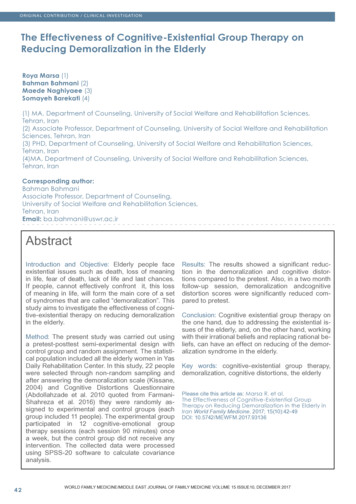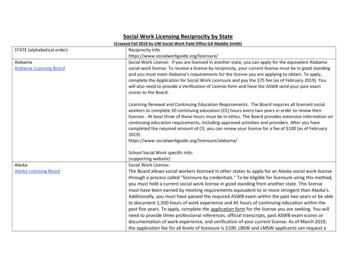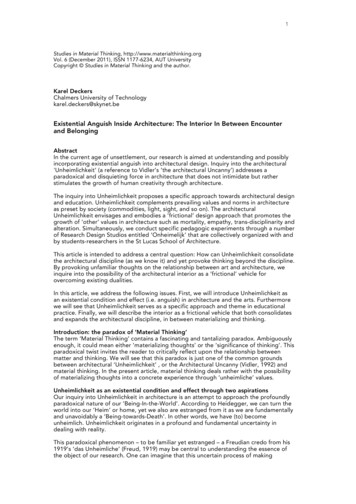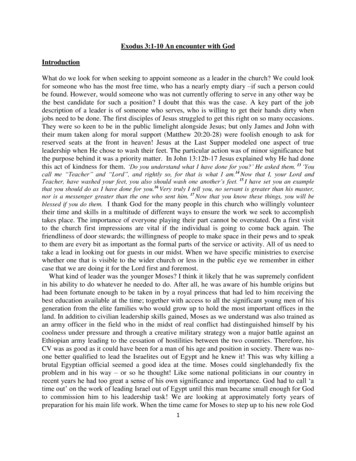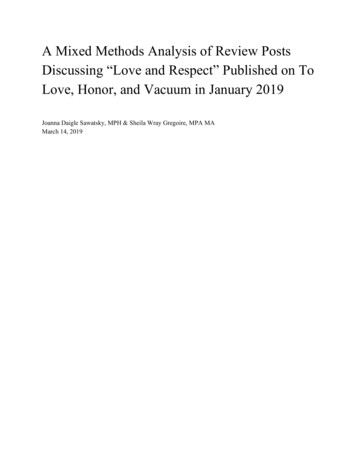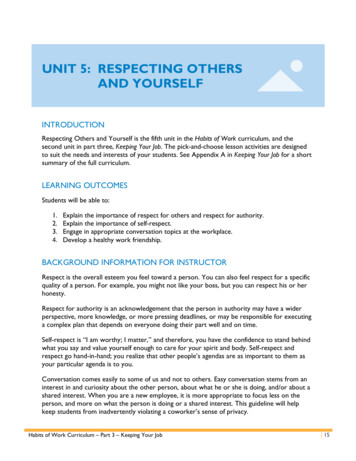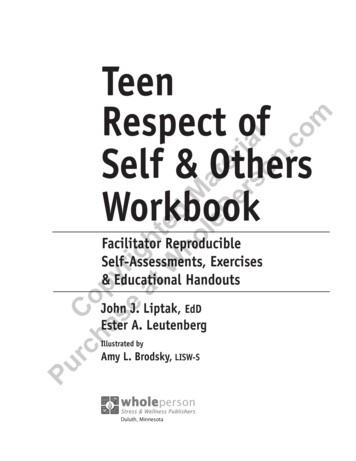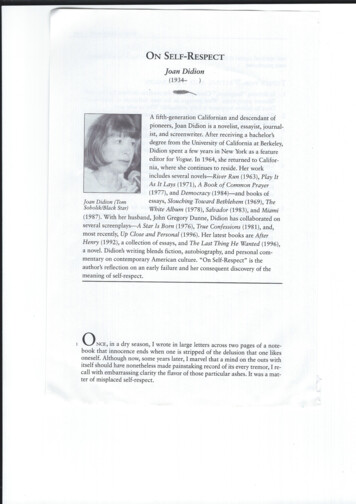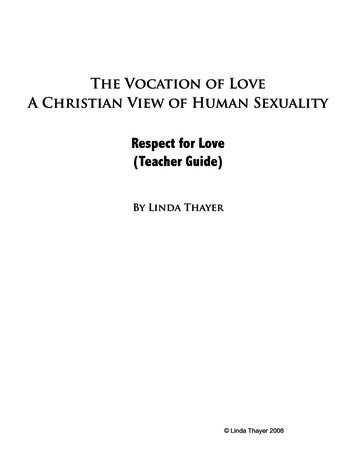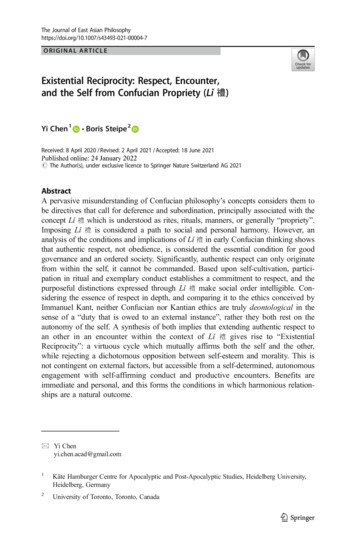
Transcription
The Journal of East Asian -7ORIGINAL ARTICLEExistential Reciprocity: Respect, Encounter,and the Self from Confucian Propriety (Lǐ 禮)Yi Chen 1& BorisSteipe 2Received: 8 April 2020 / Revised: 2 April 2021 / Accepted: 18 June 2021# The Author(s), under exclusive licence to Springer Nature Switzerland AG 2021AbstractA pervasive misunderstanding of Confucian philosophy’s concepts considers them tobe directives that call for deference and subordination, principally associated with theconcept Lǐ 禮 which is understood as rites, rituals, manners, or generally “propriety”.Imposing Lǐ 禮 is considered a path to social and personal harmony. However, ananalysis of the conditions and implications of Lǐ 禮 in early Confucian thinking showsthat authentic respect, not obedience, is considered the essential condition for goodgovernance and an ordered society. Significantly, authentic respect can only originatefrom within the self, it cannot be commanded. Based upon self-cultivation, participation in ritual and exemplary conduct establishes a commitment to respect, and thepurposeful distinctions expressed through Lǐ 禮 make social order intelligible. Considering the essence of respect in depth, and comparing it to the ethics conceived byImmanuel Kant, neither Confucian nor Kantian ethics are truly deontological in thesense of a “duty that is owed to an external instance”, rather they both rest on theautonomy of the self. A synthesis of both implies that extending authentic respect toan other in an encounter within the context of Lǐ 禮 gives rise to “ExistentialReciprocity”: a virtuous cycle which mutually affirms both the self and the other,while rejecting a dichotomous opposition between self-esteem and morality. This isnot contingent on external factors, but accessible from a self-determined, autonomousengagement with self-affirming conduct and productive encounters. Benefits areimmediate and personal, and this forms the conditions in which harmonious relationships are a natural outcome.* Yi Chenyi.chen.acad@gmail.com1Käte Hamburger Centre for Apocalyptic and Post-Apocalyptic Studies, Heidelberg University,Heidelberg, Germany2University of Toronto, Toronto, Canada
The Journal of East Asian PhilosophyKeywords Confucian philosophy . ethics . propriety . respect . categorical imperative .existential reciprocity1 The Nature of Lǐ 禮“Confucian”1 norms have shaped all of East Asia’s societies, based on principles thatwere formulated by Confucius 孔夫子 (551–479 BCE)2 and his disciples and successorstwo and a half millennia ago, and that were later modified as state philosophy andadopted in virtually all of China’s dynasties since the Hàn 漢. Confucianism was wellsuited for this role. Its one arm, the Lǐ 禮,3 comprising ritual, morals, and propriety,provided a deontological framework. Its other arm, Rén 仁, essentially humane virtues,contributed the values that its morals are founded on. And thirdly, its relational focus,its emphasis of societal harmony, hierarchy and order, were suitable to frame the needsof statecraft as consequentialist objectives.However, a joint emphasis on virtue and duty creates an inherent paradox: thevirtuous need no rules, and the mere display of rule-conforming behaviour does not initself make one virtuous. Indeed, co-opting the form of Confucian principles as a methodto achieve a specific, desirable result contradicts the very premise of virtuous behaviour,since actions that are performed for the sake of reward are the antithesis of aself-motivated expression of respectful responsibility (cf. Chen & Steipe, 2022a). Thus,understanding Confucianism as a canon of directives, a rulebook, would contradict it atits core. As expressed by Confucius himself, prescribed ethical values are neithereffective nor sustainable: “Control them with rule, govern them with punishment, thepeople will be deceitful and have no shame. Lead them with virtue, unite them in Lǐ 禮,there will be honor and principle. [道之以政, 齊之以刑, 民免而無恥; 道之以德, 齊之以禮,45有恥且格。 ]” (Analects 2.3). ,Throughout this article, we use the term “Confucian” to denote the consistent philosophical principles thatwere expressed in the Analects (Lúnyǔ《論語》) and the Book of Rites (Lǐjì《禮記》). Whether or not thosewere formulated by Confucius himself and recorded by his disciples, whether they represent original thinkingby his successors, or reflect the views of later editors of the received texts is of secondary importance; as longas the precepts and conclusions are consistent. Similarly, we use the name “Confucius” as a metonymy forpronouncements of this tradition, not to express a claim of authorship.2Confucius’s family name (姓) is Kǒng 孔, his given name (名) is Qiū 丘, his courtesy name (字) is Zhòng Ní 仲尼. Here we use the name Confucius as metonymy for early Confucian thought, and, where appropriate for theapocryphal speaker in the received text. To the best of our modern understanding, while some of the sayingslikely quote Confucius’ words, the Analects was not authored by the historical person, but was compiled,arranged and edited for over 200 years. An attempted reconstruction of the provenance and its implications isgiven in the text-critical translation of Brooks and Brooks (1998) but details remain controversial.3Some of the terms we discuss here have no precise English translation at all. We transliterate those words,capitalized, and follow them with the character (e.g. Lǐ 禮, Rén 仁, Tiān 天, and Dào 道). For others, Englishwords exist that are sufficiently close, yet are significantly different in meaning. In those cases, we italicize andgive the Chinese word only where it is first used, e.g. gentleman (君子).4All Chinese sources were obtained from the online ctext corpus (Sturgeon, 2011). English translations are bythe authors.5The antithetical parallelism of the first and fourth clause contrasts rule (政) – here to be understood as law, i.e.the type of rule that is enforced by punishment – with virtue (德). But from the perspective of ethics, law andvirtue have comparable contents: they express norms of society and are not antithetical – the intent of thispassage is not to claim that law and virtue are opposites. The contrast in fact concerns the way these norms arerealized. The law commands, virtue is a person’s nature; therefore we translate “control” in the thesis and“lead” in the antithesis, though both are the same character 道 in the original. This point is easily missed, due tothe repeated characters of the parallel structures – which are, however, not equivalent.1
The Journal of East Asian PhilosophyWe show that the paradox is resolved when we analyze the self not as a static,pre-given absolute, but as dynamically constituted in and through its relationships. Thisview is supported by the understanding of the roles and expressions of Lǐ 禮, it explainsthe need to insist on authentic behaviour, rather than just pragmatic fulfilment of moralnorms, and it entails the convergence of Confucianism’s core virtue, Rén 仁, with itscore method, self-cultivation (修身). We see significant value in this: though much ofthe explicit tenets of Confucianism are no longer aligned with our social and politicalrealities, a philosophical inquiry into meanings and implications gives us new ways toaddress the ethical issues of today (e.g. Chen & Steipe, 2022a).Propriety is a central theme here. Propriety means “conformity to accepted standardsof behavior or morals” (OED, 2019), but what do we mean by conforming, what is astandard and what is moral, how does it become accepted? All that is clear is that weare speaking of a position which the self takes versus an other, extended to society.Moreover, when we discuss Asian philosophy, we do not precisely mean “propriety” inthe first place; propriety is just one of several aspects of the Confucian concept Lǐ 禮,6which includes a canon of rites and rituals, customs, and manners, but also detailedinstructions for everyday behaviors, as well as the general attitude that underlies them,which supports values such as loyalty, moderation, filial piety, trustworthiness, fraternity etc. Thus, with its broad scope, Lǐ 禮 can be seen as a “cultural grammar” (Li,2007) and this actualization of Confucian values and ethics in all aspects of life goessignificantly beyond just “propriety”.The question arises how ethics based on individual conduct could be actualizedtowards a harmonious society, all the more since Lǐ 禮 cannot have a purpose: if it had apurpose, it would be that purpose that would be the condition of personal and socialharmony, and not the Lǐ 禮, Lǐ 禮 would be only a method.71.1 Lǐ 禮 from PrecedenceThe Lǐ 禮 are rooted in the mythical origins of China – the age of “the three sovereignsand five emperors” (三皇五帝) – and they were considered largely established evenbefore the time of the Xià 夏, China’s first historical dynasty. Confucius claimed forhimself to be merely a “transmitter” of this ancient wisdom: “I recount but do notcompose, I trust and cherish the ancient [述而不作, 信而好古 ]” (Analects 7.1).Yet Confucius was as far removed from these origins in time as we are from Confuciustoday. What then exactly is being recounted?Chapter 9 (Lǐ Yùn 《禮運》)8 of the Book of Rites (Lǐ Jì《禮記》) gives Confuciusunderstanding of what made the Lǐ 禮 essential for social harmony:6We use the definite article “the Lǐ 禮” when we talk about specific instances, and simply “Lǐ 禮” when thefocus is on the general principles.7Confucius’ disciple Yǒuzǐ (有子) expresses this as: “The use of Lǐ is to make harmony valued. However,harmony is not to be pursued for its own sake. Without the meter of Lǐ, harmony cannot obtain. [禮之用, 和為貴。 有所不行, 知和而和, 不以禮節之, 亦不可行也。 ]” (Analects 1.12).8The Chinese character 運 in the chapter title has two meanings: one denotes “evolving” (演變), the otherimplies “rotation” (運轉). Whereas evolving emphasizes changes in time, rotation indicates seasonal returningand repetition. For a detailed discussion, see Wang (2009, 390).
The Journal of East Asian Philosophy大道之行也, 天下為公。 選賢與能, 講信修睦, 故人不獨親其親, 不獨子其子, 使老有所終, 壯有所用, 幼有所長, 矜寡孤獨廢疾者, 皆有所養。 男有分, 女有歸 是謂大同。今大道既隱, 天下為家, 各親其親, 各子其子, 貨力為己, 大人世及以為禮。 禹、湯、文、武、成王、周公, 由此其選也。 此六君子者, 未有不謹於禮者也。 以著其義, 以考其信, 著有過, 刑仁講讓, 示民有常。 如有不由此者, 在勢者去, 眾以為殃, 是謂小康。When there was the Great Dào 道, all under the heaven was transparent. Good, andcapable leaders were chosen, trust and harmony were cultivated, so that people didnot only respect their own parents, care about their own children, but all elders weretaken good care of until the end of their lives; all strong men were employedaccording to their capacities, and all children grew healthily; widowers, widows,and orphans, the childless, disabled or infirm were well treated. Men had their ownsuitable professions; women had their own suitable husbands. This is called“Grand Unity”.Nowadays, since the Great Dào 道 became obscured, all under the heaven is forfamilies, and every family is only close to their own parents, all parents cherishtheir own children; goods and strength are applied for self-interests, ranksinherited through generations are considered to be Lǐ 禮. Thus, King Yǔ 禹, King Tāng 湯, King Wén 文, King Wǔ 武, King Chéng 成, andthe Duke of Zhōu 周公 distinguished themselves. None of these six gentlemen (君子) was not cautious about Lǐ 禮, so that justice was encouraged, trustworthinesswas demonstrated, mistakes were corrected. Rén 仁 was exemplified, as thehumble was praised. The constant role models were presented to the people. Ifthere was someone who did not follow, he would be removed from his position,and everyone would consider such thing to be disastrous. This was the society ofMinor Prosperity (小康). (Book of Rites 9.1–2)What early Confucians mean by Dào 道 is expressed in the influential first passage ofChapter 31 “Doctrine of the Mean” (Zhōng Yōng 《中庸》) of the Book of Rites:9 “Thatwhich the Mandate of Heaven brings forth is called nature; that which leads nature is calledDào 道 [天命之謂性, 率性之謂道 ]” (Book of Rites 31.1). Understanding how theDào 道 is conceptualized here pivots on the word shuài 率,10 which is not to be read asan externally imposed command but as an inherent tendency. Thus, the essence of Dào道 is self-organization of matters through their own direction. The Great Dào (大道) ofConfucius’ account acts in a pre-historic Utopia – the Grand Unity (大同) – in which itwas the natural state of affairs, and social harmony prevailed at all levels. Thus, one path9From the twelfth century Neo-Confucian tradition until the end of imperial times, the Doctrine of the Mean(《中庸 》) was separately listed as one of the “four canonical books” (四書) of the Confucian classics, the coreof the civil service examinations; another of the four books, The Great Learning (《大學 》), is also originallya chapter of the Book of Rites, the other two books are the Analects (《論語》) and Mencius (《孟子》).10率 (shuài), normally translated as “to follow”, but in this case, with reference to the Dào 道, “lead” ispreferred.
The Journal of East Asian Philosophyto social harmony is achieved when all of society naturally assumes their appropriaterole.The Great Dào can however become obscured. Although the quoted passage is not ahistorical account, the social upheaval that is described would correspond to thetransition of small, decentrally led, tightly knit Neolithic population units with fewpersonal possessions, to a centrally governed society, gravitating to nascent urbancentres, organizing division of labour and trade of commodities, laying claims to landand property, and enjoying the resultant prosperity. But material wealth brings with it afear to lose what one has, and such anxiety fundamentally changes the balance ofhuman relationship: the other, previously an essential ally, becomes a perceivedcompetitor. Moreover, since all possessions are always lost in death, the only way topreserve one’s prosperity beyond one’s own life is to pass it on to a conceptuallyextended, “genetic” self – and this means to favour family relations over all others. Inthe era of Grand Unity, widowers, widows, orphans, and the childless were well treated,i.e. those segments of society who had no family to lean on. Lǐ 禮 was a spontaneousmode of social conduct and did not require explicit expression, relationships weresimply a “matter of lǐ [禮之事]” (Ing, 2019, 91). In contrast, “nowadays all under theheaven is for families”, i.e. “trust and harmony” were replaced with selfish acts ofcompetition. In Confucius’ understanding, the root of social conflict in a prosperingsociety, is, paradoxically, a by-product of prosperity itself.The remedy, according to Confucius, was to establish an alternate expression of Lǐ 禮 asa condition for harmony, and allow prosperity to be enjoyed by all.11 The apocryphal sixSage Kings achieved this not through coercion, but through embodiment; they served asrole models. Their deliberate and cautious performance made Lǐ 禮 explicit, it required the“name of lǐ [禮之名]”.12 The distinction is functional, and the ethical impulses thattransformed society came from within. A return to Utopia is neither possible nor desirable– prosperity after all safeguards against famine and natural disasters; it provides infrastructures and security. Confucius cites the historical evidence that it is possible to mitigatethe side-effects through the Lǐ 禮 – if Lǐ 禮 is properly applied, and emphasizes in thefollowing passage that this is literally a matter of life or death:夫禮, 先王以承天之道, 以治人之情。 故失之者死, 得之者生。Lǐ 禮 is how the former Sage Kings conveyed the Dào of Heaven, in order tochannel13 the emotion of humans. Therefore, those who abandon it would die,and those who achieve it would live. (Book of Rites 9.3)Significantly, Confucius uses the concept channel (治), a character originally related towater, indicated by its radical, which he brings into correspondence with convey (承).Rather than imposing constraints, Lǐ 禮 is understood to guide human emotions11Note that we should not assume the harmony (和) of Grand Unity and Minor Prosperity, and indeed ourmodern times, to be the same.12The basic values remain the same, though the transition between Grand Unity and Minor Prosperity increases notonly the need for Lǐ 禮, but also its complexity and elaboration (Ing, 2019, 87). For the distinction and discussion of“the matter of lǐ [禮之事]” and “the name of lǐ [禮之名]”, see Ing (ibid., 91).13Rather than the more common translation “govern”, we choose “channel” to match the etymologicalreading of 治.
The Journal of East Asian Philosophyaccording to their innate tendencies, and it manifests in heart-felt expressions in ritualsand rites, customs and manners.1.2 Lǐ 禮 from PrinciplesThis all however refers to the very distant past. How did the Lǐ 禮 survive to Confucius’time? The surprising answer is: they did not. As he explains to his disciple Yán Yàn (言偃), the Lǐ 禮 of his philosophy are due to him himself.言偃復問曰 :「 夫子之極言禮也 , 可得而聞與 ?」 孔子曰 :「 我欲觀夏道 , 是故之杞 ,而不足徵也; 吾得夏時焉。 我欲觀殷道, 是故之宋, 而不足徵也; 吾得坤乾焉。 坤乾之義, 夏時之等, 吾以是觀之。 」Yán Yàn (言偃) asked again, “Our Master esteems Lǐ 禮 to be utmost important,would it be possible for us to acquire the knowledge of Lǐ 禮?” Confucius replied,“I wanted to perceive the Dào 道 of the Xià 夏 dynasty, so I went to the state of Qǐ杞, but there were not enough traces left; I obtained knowledge on the almanac ofXià. I wanted to observe the Dào 道 of the Yīn 殷 dynasty, so I went to the state ofSòng 宋 but there were not enough traces left; I obtained knowledge on the KūnQián 坤乾 [cosmology].14 From the meaning of Kūn Qián, and the almanac ofXià, I deduced [the Lǐ 禮].”. (Book of Rites 9.4)The historic Lǐ 禮 themselves were lost to time. In this passage, Confucius identifies theinformation that he required to reconstruct their essence: (i) the core of Yīn 陰 Yáng 陽cosmology, and (ii) the almanac, i.e. a catalogue of the general occasions for whichrituals ought to be performed, i.e. their categories. However, there is a third, implicitingredient we must not overlook: Confucius’ premise that moral and social guidance isto be found in the historic past in the first place, i.e. (iii) a premise of ancestralrelevance. Thus, through this passage, the Confucian project not only claims exclusiveauthority to evaluate propriety for actual statecraft, but also establishes the contents(cosmology) and scope (almanac) of such propriety.But it is the third component that has the deepest implications:15 deference toexcellent ancestors not only provides a justification through precedence, beyond themere opinions of the philosopher, but it establishes a cultural continuity whichreinforces that the Lǐ 禮 need to be internally propagated, as every individual’scultural genes. This seems to us to be one of the most significant positions thatdifferentiates Confucianism’s mode of argumentation from other schools ofthought: whereas Legalism discusses how rules could be made excellent, andMohism offers philosophical opinions on the value of specific types of14Kūn Qián 坤乾, the Earth and Heaven trigrams, refers to book(s) on Yīn 陰 Yáng 陽 cosmology prior toConfucius’ times. For historical information, see Wang (2009, 395).15Note that the justification of ideals by reference to historic examples is not a self-evidently correct position.For example, Hutton (2008) discusses in detail the central role that objections to this idea play in the criticismof Confucianism, expressed by Hán Fēizǐ 韓非子 (ca. 280–233 BCE), the hugely influential founder ofLegalism. The argument against that – it would make it hard for Confucians to distinguish their school fromothers (Hutton, 2008, 452) – is one of expediency, and does not address the principled validity of theConfucian position. That might be a problem for Confucian “schools” but not for the philosophy as a whole.
The Journal of East Asian Philosophyrelationships, Confucius derives the features of sustainable governance from innatevirtue.16 This entails a need for the self to be involved, and the need for thisinvolvement to be authentic.17At this point, the second arm of Confucius’ philosophy comes into play: Rén 仁(originally “seed”, or “generative force” (cf. Wang, 2012)), is a quintessentially Confucian concept, likely coined by Confucius himself. In the Analects, it is never used inits literal meaning, but it metaphorically acquires a very specific sense, or rather two:either the sum-total of “all human virtues”, or “kindness and compassion” (Ni, 2017,32–35).18 As an achievement of the humane, Roger Ames and Henry Rosemont Jr.interpret Rén 仁 as “Human Becoming” (1999, 48–51). That such humaneness is thesame word as a seed grain is revealing,19 as is the fact that the character 仁 is composedfrom the glyphs for “human”, 人, and “two”, 二. At the very base Lǐ 禮 and Rén 仁 aredifferent perspectives on the same thing, and they both manifest a relational Dào 道.When Confucius invokes the example of the Sage Kings this is emphatically not aproposal to imitate their acts, nor even to imitate their path to excellence. The “lessons”from antiquity must be “warmed up” for each new learning, as in the well-known, lessunderstood Confucian saying: “Warming up the old but knowing the new, that makesone a teacher. [溫故而知新, 可以為師矣。 ]” (Analects 2.11).20 Considering the pastprovides an illuminating distance; the self appears in this reflection as an element ina continuing succession, and that is what makes a historic example both relevant andmeaningful. That Lǐ 禮 can bring about social harmony is supported by the historicprecedence, and, according to Confucius, the crucial ingredients are already inherent inus all. Such propagation of virtue, rather than imposition of morals, allows authenticityto apply itself; indeed, treating the Sage Kings as authorities, rather than as the roots ofa tradition in which one oneself partakes would stand in the way of personalinvolvement.Such a philosophical approach to manage relationships, not based on demandingbehavior but on strengthening attitudes, is intriguing, but not straightforward to implement: Lǐ 禮 is neither a method, nor a policy. Propriety can be derived from Lǐ 禮, butproper behaviour cannot substitute. Lǐ 禮 is the condition of propriety and its actualization through self-improvement is fundamentally personal.Cf. Analects 2.3 (“Control them with rule ”), quoted above.The need for authentic engagement is expressed throughout the Analects. Analects 3.12 (“If I would notparticipate ”) is discussed below. The importance to consider character is expressed in Analects 2.10. That Lǐ禮 requires respect is said explicitly: “ abiding by Lǐ 禮 without respect how were I to regard such a one?[ 為禮不敬 吾何以觀之哉?]” (Analects 3.26). We read Confucius proclamation: “A gentleman is not autensil [君子不器]” (Analects 2.12) to express the same idea, to name but four examples.18The frequency of occurrence of Rén 仁 in the Analects and the space given therein to its explanationsupports that its specific meaning of an ethical core of human nature and the process of embodying it was notcommon, but was established by Confucius himself. For the original pre-Confucian meaning of the word Rén仁 as kernel and openness, see Wang (2012), and the recent analysis of Curtis (2016). For the intricaterelationship between the two most important Confucian concepts Rén 仁 and Lǐ 禮, see Li (2007).19Rén 仁 in its meaning of kernel or seed is widely used in Modern Chinese compounds such as: “杏仁”(almond), “核桃仁” (walnuts), or generically “果仁” (nuts, seeds, or pits), but also “蝦仁” (shrimp tails).20Note the caesura created by the particle 而, which leads us to reject the “causal” reading in which thispassage is commonly translated: “warming up the old in order to learn about the new ”. We read this passageas an inquiry, a gesture of asking questions to the old to derive insights for the new, without assuming any rightor wrong beforehand.1617
The Journal of East Asian Philosophy1.3 Lǐ 禮 from PerformanceLǐ 禮 is not only a canon of virtue, it also provides access to virtue through its “other”aspect: ritual. Lǐ 禮 is thus a cultivation of ethical values through practice. Ritual makesthe relation of self and value explicit through its experiential, participatory nature andthereby is able to initiate their actualization.21The Book of Rites devotes a majority of its space to seasonal, sacrificial, andancestral rites that express reverent connections with Tiān 天,22 and to pray forprosperity. Such prayers need not be understood as a belief in the ruler’s ability toinfluence the supernatural, their importance lies more generally in their state-affirmingnature and to consolidate the hierarchy of the centralized political systems. Forexample, the Book of Rites describes in detail a ritual performed in the Bright Hall23by the Duke of Zhōu, conducted for the Son of Heaven (天子), the rank given to thehighest ruler, the king, or later, the emperor. The ritual is not only performed for hisown officials and state chiefs, but also includes representatives from neighbouring andremote foreign countries and tribes, thus relating the entire world to the centre of Zhōu周 power. This relation is not only conceptual but reflects the actual geography, with the“Barbarians”, the tribes outside the empire, placed outside the hall, at the cardinaldirections where they were geographically located. As a result, this choreographedarrangement represents the entire world, mapped to a single building, where hierarchyis reflected (i) in the specific position (位) for each level of the peerage system atvarying distance from the centre; (ii) in the direction that each group faces, which isalways towards the Son of Heaven in the centre; and (iii) in an explicit ordering withineach group. Thereby higher and lower societal ranks, various and distant nations,ethnic- and geographic identities are made manifest for each participant both as aperson, and as a representative. Such relationships are not abstractly proclaimed, butdirectly experienced, framed in a choreography of dignified etiquette and manifest aphilosophical, not merely political network of interdependent relationships, in whichevery individual is grounded and oriented.24 The overarching structure is hierarchical,but since it is not hierarchy for its own sake, but a tool for efficient governance, it must21For a “small-scale” illustration, consider how a smile in and of itself has a positive influence on well-being(e.g. Kraft & Pressman, 2012), or how straightening one’s posture, or walking with confidence affects theself-image.22The Chinese Tiān 天 is a broad philosophical concept. Literal translations such as “heaven” or “god” do notdo justice to its scope and meaning, thus we keep the original. For a detailed explanation, see Ames andRosemont (1999, 46–48).23The “Bright Hall” (明堂) is a type of ceremonial architecture; different palaces each had their own actualstructure. Reflecting the cosmo-geography of the Chinese belief system, the layout of urban space and palacearchitecture in the capitals had ritual significance: the Bright Hall would likely have had a square base and around ceiling to represent the cosmography, and the four sides of the hall, plus the centre, reflect the quinarysystem (五行). The details however are more obscure than expected for such an important focus of politicalpower. Apparently, the desire to base political legitimacy on historic precedents has made the sources of ourknowledge unreliable (cf. Corradini, 1995).24Chenyang Li refers to this philosophical meaning of Lǐ 禮 as its “thickness”: “When performing religious orfilial rituals, for example, one must be reverent (敬). Confucius asks, ‘When [we] say li, does it merely meanthe jade and silk [items used in rituals]?’ Analects 17.11. Obviously, li in this context means not just theinstruments or equipment of the ritual. Li in the ‘thick’ sense has to do with how the ritual is performed, bywhat kind of people, and with what attitude. In the Analects, li is normally used in this thick sense. When usedin the mere formal sense, li is at best instrumental.” (Li, 2014, 60).
The Journal of East Asian Philosophybe based on virtue. This resonates with a passage in the Book of Rites: “Once centred onharmony, everything has its position and all things flourish. [致中和, 天地位焉, 萬物育焉。 ]” (Book of Rites, 31.1). The metaphorical position of everything in this system –literally [all things of] heaven and earth – is both the consequence and the cause ofharmony and prosperity and it is this understanding that the actual positions in theBright Hall evoke, a mutual establishment, enabled by participatory practice.Such practice to establish philosophical relationships has become inaccessible, since therelationships and conditions to which the Lǐ 禮 of the Chinese Classics refer have been lostin time and have lost their significance. Participatory access at this scale is closed to us.There is however another, intriguing aspect: the interaction of ritual with the individual selfthrough rituals of self-cultivation.1.4 Lǐ 禮 from ConductThe daily routines of a gentleman (君子), one who embodies Confucian virtue toperfection, are described in Chapter 13 (Yù Zǎo 《玉藻》) of the Book of Rites:君子之居恒當戶, 寢恒東首。 若有疾風迅雷甚雨, 則必變, 雖夜必興, 衣服冠而坐。 日五盥, 沐稷而靧粱, 櫛用樿櫛, 發曦用象櫛, 進禨進羞, 工乃升歌。 浴用二巾, 上絺下綌, 出杅, 履蒯席, 連用湯, 履蒲席, 衣布曦身, 乃屨進飲。The gentleman’s dwelling always has him face the door:25 He always sleeps with hishead in the east. When a thunderstorm brings pouring rain, he must change, get upeven at night, don robes and cap, and sit. He washes his hands five times a day, hewashes his hair with millet water, his face with sorghum water, he uses a boxwoodcomb, for dry hair he uses an ivory comb, drinks and refreshments are served andsongs rise from his musicians. He uses two kinds of towels for his bath, fine linen forthe upper [body], coarse linen for the lower. Leaving the bathtub, he steps on a rushmat, rinses with warm water, steps on a cattail mat, puts on a cloth gown to dryhimself
from within the self, it cannot be commanded. Based upon self-cultivation, partici-pation in ritual and exemplary conduct establishes a commitment to respect, and the purposeful distinctions expressed through Lǐ 禮 make social order intelligible. Con-sidering the essence of respect
